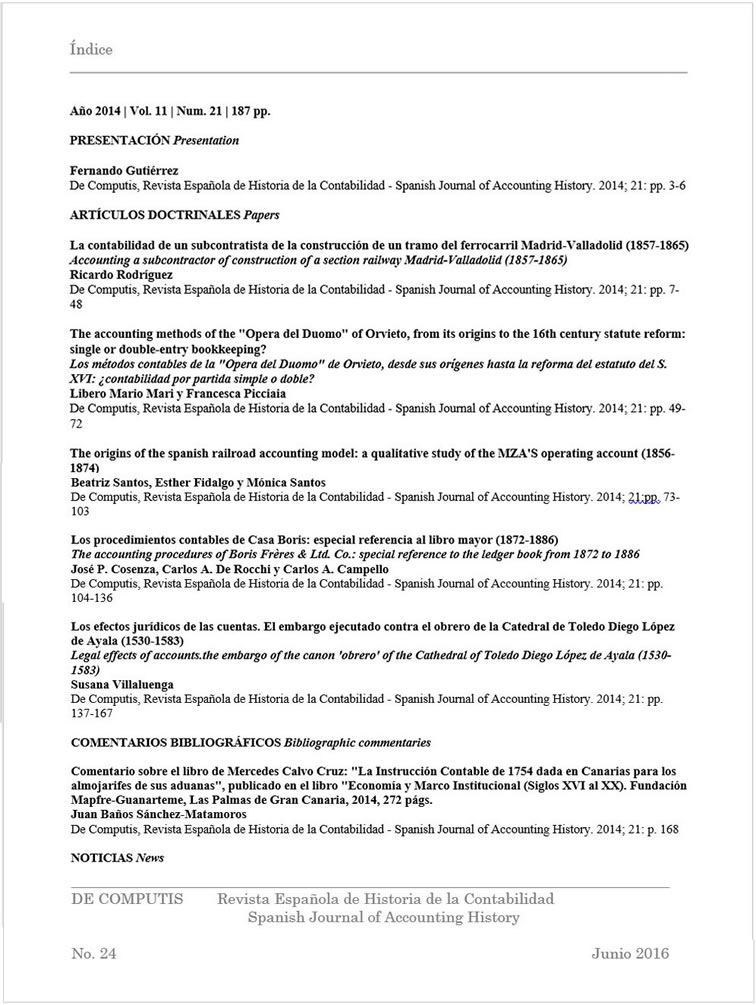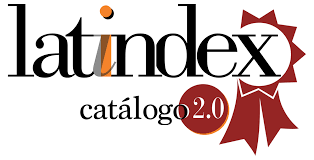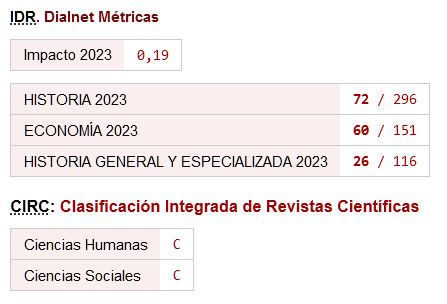The origins of the spanish railroad accounting model
a qualitative study of the MZA'S operating account (1856-1874)
DOI:
https://doi.org/10.26784/issn.1886-1881.v11i21.39Palabras clave:
Railway accounting, MZA Railway, Operating Account, Railway productive processResumen
The lack of external regulation about the form and substance of the financial statements that railroad companies had to report during the implementation phase of the Spanish railway, meant that each company developed its own accounting model. In this study we have described, analysed and interpreted the more relevant changes in the accounting information in relation to the business result. Using the analysis of an historical case, we developed an ad-hoc research tool, for recording all the changes of the operating account. The results of the study prove that MZA’s operating account reflected the particularities of the railway business although subject to limitations, and the reported information improved during the study period in terms of relevance and reliability.
Descargas
Citas
Anes, R. (1978): "Relaciones entre el ferrocarril y la economía española (1865-1935)" en Artola, M. (dir.) (1978): Los ferrocarriles en España (1844-1943), Servicio de Estudios del Banco de España, Madrid, Vol. II, 355-512.
Artola Gallego, M. (1978): "La acción del Estado", en ARTOLA, M. (Dir.): Los ferrocarriles en España, 1844- 1943, Madrid, Banco de España, Vol. 1, 341-453.
Basu, S. (2003): "Discussion of Enforceable Accounting Rules and Income Measurement by Early 20th Century Railroads", Journal of Accounting Research, Vol. 41 (2), 433-444. https://doi.org/10.1111/1475-679X.00111
Bernal, M. (2004): "La regulación de las sociedades anónimas y la información contable publicada en la Gaceta de Madrid a mediados del siglo XIX". Revista Española de Financiación y Contabilidad, Vol. XXXIII ene-mar, No 120, 65-94. https://doi.org/10.1080/02102412.2004.10779514
Boockholdt, J. L. (1977): "Influence of the 19th and 20th railroad accounting on the development of modern accounting theory", Accounting Historian Journal, Vol. 5, No. 1, 9-28. https://doi.org/10.2308/0148-4184.5.1.9
Boyns, T.; Edwards, J. R.; Nikitin, M. (1997): "The development of industrial accounting in Britain and France before 1880: a comparative study of accounting literature and practice1", European Accounting Review, (6) 3, 393-437. https://doi.org/10.1080/713764730
Bryer, R.A. (1991): "Accounting for the great "railway mania" of 1845. A great railway swindles?" Accounting, Organizations and Society, (16), No 5&6, 439-86. https://doi.org/10.1016/0361-3682(91)90038-G
Chandler, A.D. (2008): La Mano Visible. Ed. de Belloch, S.L., Barcelona (1ª ed. 1977: The Visible Hand: The Managerial Revolution in American Business. Harvard University Press).
Colón de Carvajal Fibla, B. (2010): Los orígenes remotos del contrato de colaboración entre el sector público y el sector privado. Noticias jurídicas. Artículos doctrinales: Administrativo. Febrero, 2010. http://noticias.juridicas.com/articulos/15-Derecho-Administrativo/304-los-or-genes-remotos-del-contrato-decolaboraci-n-entre-el-sector-p-blico-y-el-sector-privado.html
Comín Comín, F. et al (1978): 150 Años de Historia de los ferrocarriles españoles, Fundación de los Ferrocarriles Españoles y Anaya, Madrid, 2 Vol.
Cordero, R. y Menéndez, F. (1978): "El sistema ferroviario español" en ARTOLA, M. Los ferrocarriles en España (1844-1943), Banco de España, Madrid, Vol. I, 161-338.
Edwards, J. R. (1980): British Company legislation and Company Accounts 1844-1976, New York, NY: Arno Press.
Edwards, J. R. (1986): "Depreciation and Fixed Asset Valuation in Brithis Railwail Company Accounts to 1911". Accounting and Business Research, Summer, 251-263. https://doi.org/10.1080/00014788.1986.9729324
Edwards, J. R. (1989): A History of Financial Accounting, London: Routledge
Fidalgo, E. y Miranda, R. (2006): "El sistema contable de la compañía de ferrocarriles de MZA en sus inicios (1857-1908): un estudio introductorio", XII Encuentro ASEPUC, Burgos.
Fink, A. (1875): Cost of Railroad Transportation. Railroad Accounts and Government regulation of Railroad Tariffs. Louisville (Extract from the annual report of the Louisville & Nashville Railroad Co. Printed by John. P. Morton).
Fontana, J. (2007). "La época del liberalismo" en Fontana, J. y Villares, R. (dir.): Historia de España (Vol VI) Crítica.
Frax Rosales, E. (1996): "Las Leyes de Bases de obras públicas del siglo XIX", Revista de Estudios Políticos (Nueva Época), Madrid, 1996, No. 93, 513-528.
Fuentes, J. F. (2007): El fin del Antiguo Régimen (1808-1868). Política y sociedad. Madrid: Síntesis
Fuertes Fernández, A. (2007): "Fundamentos de la Colaboración público-privada". Revista del Derecho de las Telecomunicaciones, Transportes e Infraestructuras (REDETI), Año X-No. 29, Mayo-Agosto 2007. Versión revisada y corregida en Madrid, a 20 de enero de 2009: Centro Europeo de Regulación Económica y Competencia (http://www.cerecom.org/)
Garcés, B. V. (1875-1882): Diccionario razonado legislativo y práctico de los Ferrocarriles Españoles bajo el aspecto legal, técnico, administrativo y comercial de los mismos. Imp. De Campuzanos Hnos., Madrid (2ªed.)
Glynn, J. J. (1984): "The development of British railway accounting: 1800-1911", The Accounting Historians Journal, vol. II (1), 103-18.
https://doi.org/10.2308/0148-4184.11.1.103
Gómez Mendoza, A. (1981): "Los ferrocarriles y la industria siderúrgica, 1855-1913", en Los ferrocarriles y el desarrollo económico de Europa Occidental durante el siglo XIX, Renfe, Madrid, 129-146.
Gómez Mendoza, A. (1982): Ferrocarriles y cambio económico en España (1855-1913). Un enfoque de nueva historia económica, Alianza Ed., Madrid.
Greene, T. L. (1892): "Railway Accounting" Political Science Quarterly, (7) 4, December, 598-612. https://doi.org/10.2307/2139443
Heier, J. R. (2009): "Building the Union Pacific Railroad: a study of mid-nineteenth-century railroad costruction accounting and reporting practices". Accounting History Review, Vol. 19, No. 3, 327-351. https://doi.org/10.1080/09585200903246775
Hernández Esteve, E. (2010): La Historia de la Contabilidad, vía privilegiada de aproximación a la investigación histórica: Cuentas de los fondos recibidos por la Factoría General de los Reinos de España para financiar la guerra de Felipe II contra el Papa Pablo IV y Enrique II de Francia (1556-1559). Discurso de Ingreso. Real Academia de Doctores de España, Madrid. https://doi.org/10.26784/issn.1886-1881.v7i13.285
Herránz Loncán, A. (2003): "¿Fracasó el sistema ferroviario en España? Reflexiones en torno a la «paradoja del ferrocarril español»", Revista de Historia Industrial, No. 23, 39-64.
Herránz Loncán, A. (2006): "Railroad Impact in Backward Economies: Spain, 1850-1913" The Journal of Economic History, (66), 4, 853-881.
https://doi.org/10.1017/S0022050706000350
Hinojosa, S. A. (2007): "Asociaciones Pública-Privadas: Una nota conceptual", Workshop Ética y Empresa, ESADE Business School, Barcelona, nov. 2007
Hoskin, K. W. & Macve, R. H. (1986a): The Genesis of Accountability: The West Point Connection: British Accounting Assoc. Conference, Aberystwyth
Hoskin, K. W. & Macve, R. H. (1986b): Accounting and the Examination: A Genealogy of Disciplinary Power. Accounting Organizations and Society, (11), 2, 105-136. https://doi.org/10.1016/0361-3682(86)90027-9
Lardner, D. (1850): Railway economy: a treatise on the new art of transport, its management, prospects and relations commercial, financial and social, Harper & Brothers, New York.
Lemarchand, Y. (1993): Du dépérissement à l'amortissement. Enquête sur l'histoire d'un concept et de sa traduction comptable. Ouest Editions, Nantes.
Lemarchand, Y.(1994): Double entry versus charge and discharge accounting in eighteenth-century France, Accounting, Business & Financial History, (4) 1, 119-145. https://doi.org/10.1080/09585209400000040
Machuca García, J. R. & Muñoz Rubio, M. (1998): El camino del tren: 150 años de infraestructura ferroviaria. Fundación de los Ferrocarriles Españoles, Madrid.
Martínez Vara, T. (2001): "Los costes laborales de una empresa líder: La Compañía de los Ferrocarriles de Madrid a Zaragoza y a Alicante (1913-1935)", II Congreso de Historia Ferroviaria, Aranjuez (Madrid).
Martínez Vara, T. (2004): "Los costes laborales y la crisis de MZA, 1913-1935. Datos y algunas reflexiones", Revista Transporte, Servicios y Telecomunicaciones. Sumario No.7, 103-146.
Martínez Vara, T. (2006): Salarios y programas de Bienestar Industrial en la empresa ferroviaria MZA (1915-1935), Revista Investigaciones de Historia Económica, invierno, No. 4, 101-138. https://doi.org/10.1016/S1698-6989(06)70237-5
Martínez Vara, T. & Ballesteros Doncel, E. (2001a): "El empleo ferroviario como una construcción masculina. El caso de la Compañía MZA, 1857-1936", VII Congreso de la Asociación de Historia Económica, Zaragoza, 19-21 de septiembre.
Martínez Vara, T. & Ballesteros Doncel, E. (2001b): La evolución del empleo en el sector ferroviario español, 1893-1935, Revista de Historia Económica. Journal of Iberian and Latin American Economic History, 19 (3), 637-678. https://doi.org/10.1017/S0212610900009344
Martínez Vara, T. & De los Cobos Arteaga, F. (2007): "Taller Central de Vía y Obras", Revista de Historia [TST] Transportes, Servicios y Telecomunicaciones, junio, No. 12, 94-120.
Mason, P. (1933): "Illustrations of the early treatment of depreciation", Accounting, Review, Vol. VIII, 209-218
Mateo del Peral, D. (1978): "Los orígenes de la política ferroviaria en España (1844-1877)". En Artola, M. (Dir.) Los Ferrocarriles en España: 1844-1943. Servicio de Estudios del Banco de España, Madrid (I), 29-159.
Mattessich, R. (2003): Accounting research and researchers of the nineteenth century and the beginning of the twentieth century: an international survey of authors, ideas and publications, Accounting, Business & Financial History, 13:2, 125-170. https://doi.org/10.1080/0958520032000084978
May, G. O. (1936): "Railroad retirements and depreciation", The Journal of Accountancy, 171-84.
McCartney, S. & Arnold, A. J. (2000): George Hudson's financial reporting practices: putting the eastern Counties Railway in context, Accounting, Business & Financial History, 10:3, 293-316. https://doi.org/10.1080/095852000750019405
McCartney, S. & Arnold, A. J. (2003): "The railway mania of 1845-1847: Market irrationality or collusive swindle based on accounting distortions?", Accounting, Auditing & Accountability Journal, (16) 5, 821- 852. https://doi.org/10.1108/09513570310505970
Montoya, J. L. & Guzmán, I. (2011): "La Compañía de los Caminos de Hierro del Norte de España: análisis de su cuenta de explotación (1900-1925)", Revista Transportes, Servicios y Telecomunicaciones [TST], No 21, 112- 141.
Montoya, J. L. & Guzmán, I. (2012): Regulación contable del sector ferroviario español en el primer cuarto del siglo XX (1900-1925) De Computis, Spanish Journal of Accounting History. No. 17, Diciembre, 3-43
Muñoz Colomina, C. I. & Millán Aguilar, A. (2002): "La utilidad de los estados contables de las empresas para evaluar el retorno de las inversiones públicas". E-Prints Complutense. http://eprints.ucm.es/6755/
Napier, C. (2010): "The History of financial reporting in the United Kingdom" Chapter 13 in Gary Previts, Peter Walton & Peter Wolnizer (eds), A Global History of Accounting, Financial Reporting and Public Policy (Bingley: Emerald, 2010), 243-273.
Nuñez, G. & Buendía, D. (2008): "Información financiera en España durante la primera mitad del Siglo XX. Las Cuentas Anuales de la Sociedad de Tranvías Eléctricos de Granada. De Computis. Spanish Journal of Accounting History, No 8, junio, 97-137. https://doi.org/10.26784/issn.1886-1881.v5i8.163
Perelman, M. (1997): El fin de la economía. Ariel Sociedad Económica, Barcelona.
Pollins, H. (1952a): "A Note on Railway Constructional Costs 1825-1850". Economica, New Series. Vol. 19, No. 76, 395-407. https://doi.org/10.2307/2551106
Pollins, H.(1952b): "The Finances of the Liverpool and Manchester Railway". The Economic History Review. Vol. 5, No. 1, 90-97. https://doi.org/10.1111/j.1468-0289.1952.tb01454.x
Pollins, H. (1956): "Aspects of railway accounting before 1863" in, B. S. YAMEY, Studies in the history of Accounting (Sweet and Maxwell) A.C. Littleton, 332-55.
Previts, G.J. y Samson W.D. (2000): "Exploring the contents of the Baltimore and Ohio Railroad Annual Reports: 1827-1856" Accounting Historians Journal. Vol. 27, No. 1, 1-41. https://doi.org/10.2308/0148-4184.27.1.1
Richard, J. (2006): "The victory of the Prussian railway dynamic accounting over the public finance and patrimonial accounting models (1838-1884): an early illustration of the appearance of the second stage of capitalist financial accounting and a testimony against the agency theory and the market for excuses ideologies", Université Paris Dauphine (CEREG), Cahier de recherche No. 2006-15
Santos-Cabalgante, B.; Fidalgo, E. & Santos-Cebrián, M. (2012a): "Construcción de la infraestructura ferroviaria en España a través de la contabilidad: Estudio Histórico-Contable de MZA (1856-1874)". De Computis, Spanish Journal of Accounting History. No. 17, Diciembre, 158-186. https://doi.org/10.26784/issn.1886-1881.v9i17.80
Santos-Cabalgante, B.; Fidalgo, E. & Santos-Cebrián, M. (2012b): "A study on the impact of the organisational structure in the accounting reporting system: the MZA case in the 19th Century (Biennium 1857-1858)". AMSE Press. Journal Modelling, Measurement and Control. Serie C Chemistry, Geology, Environment and Bioengineering. Volumen Special, Issue 1, ICCC, 16-28.
Santos-Cabalgante, B.; Santos-Cebrián, M. & Fidalgo, E. (2011a): "Estudio de incidencias de la estructura organizativa en el sistema de información contable: el caso de MZA en el siglo XIX (bienio 1857-1858)", I International Congress on Cost Control Barcelona, 17-18
Santos-Cabalgante, B.; Santos-Cebrián, M. & Fidalgo, E. (2011b) "La actividad empresarial y la representatividad de las cifras contables: el caso de MZA en sus inicios (1856-1858)" in Before and after Luca Pacioli, Serie "R&D", Centro Studi "Mario Pancrazi" di Sansepolcro (Italia), June 2011, 745-786
Tedde de Lorca, P. (1978): "Las compañías ferroviarias en España (1855-1935)". En ARTOLA, M. Los ferrocarriles en España (1844-1943). Banco de España, Madrid (II), 9-354.
Tortella Casares, G. (1973): Los orígenes del capitalismo en España. Banca, industria y ferrocarriles en el siglo XIX. Editoriales Tecnos, Madrid.
Tua, J. (1983): Principios y normas de contabilidad: Historia, metodología y entorno de la regulación contable, Instituto de Planificación Contable, Madrid.
Valdaliso, J. M. & López, S. (2007): Historia económica de la empresa. Ed. Crítica, Barcelona.
Valdivielso Cañas, A. (2006): El marco legal de la colaboración público-privada en el proyecto de ley de contratos del sector público. Presupuesto y Gasto Público, 45/2006:11-29 Secretaría General de Presupuestos y Gastos, Instituto de Estudios Fiscales.
Villacorta, M. A. & Martínez Vara, T. (2009): "Aproximación al sistema contable de los Talleres Ferroviarios de MZA durante el siglo XIX", De Computis. Spanish Journal of Accounting History, No. 11, diciembre, 116- 135. https://doi.org/10.26784/issn.1886-1881.v6i11.134
Wais San Martín, F. (1974): Historia de los ferrocarriles españoles. Editora Nacional, Madrid.
Watanabe, I. (2007): The evolution of Income Accounting in Eighteenth and Nineteenth Century Britain, Osaka Keidai Ronshu,
(57) 5, January 2007, 21-34. Versión revisada y corregida en Madrid, a 20 de enero de 2009: Centro Europeo de Regulación Económica y Competencia (http://www.cerecom.org/)
Fidalgo, E. (1993): Una revisión de la información contable externa para el análisis de la gestión empresarial, Universidad Complutense de Madrid.
Descargas
Publicado
Cómo citar
Número
Sección
Licencia

Esta obra está bajo una licencia internacional Creative Commons Atribución-NoComercial-CompartirIgual 4.0.










